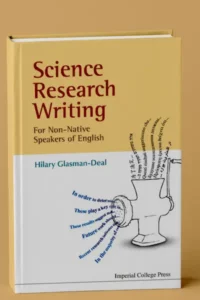Science Research Writing for Non-Native Speakers of English is designed to enable non-native English speakers to write science research for publication in English. It can also be used by English speakers and is a practical, user-friendly book intended as a fast, do-it-yourself guide for those whose English language proficiency is above intermediate.
The approach is based on material developed from teaching graduate students at Imperial College London and has been extensively piloted. The book guides the reader through the process of writing science research and will also help with writing a Master’s or Doctoral thesis in English. Science writing is much easier than it looks because the structure and language are conventiona.
Who is this book for?
The is book is designed to help non-native speakers of English write science research papers for publication in English. However, it can also be used as a guide for native English speakers who would like support with their science writing, and by science students who need to write a Master’s dissertation or Ph.D. thesis. It is a practical, rather than a theoretical book, and is intended as a fast do-it-yourself manual for researchers and scientists.
The book is aimed at those whose English language ability is at intermediate level or above. If you have taken an IELTS test, this is equivalent to a score of above 6.0; if you have taken a TOEFL test then this is approximately equivalent to a score above 550 (paper-based test) or 91 (iBT). However, if you have managed to read this far without using a dictionary, you will be able to use this book, even if you don’t understand every word.
Why do I need it?
The goal of scientific research is publication, but good scientists are not always good writers and even native speakers of English sometimes have difficulty when they write up their research. The aim of this book is to give you the information, vocabulary, and skills you need quickly and easily so that you can write confidently using the style and structure you see in the journals you read.
As a science researcher, you are able to read and understand complex, high-level material in your field. However, you may find it difficult to produce written English which is at the same level as your reading. You may feel that your English writing does not represent the content of your work effectively or accurately. The aim of this book is to enable you to use your reading ability and the material you read to develop the writing skills your work requires.
Developing the skills to write up your own research is the only way to join the international science community. If you depend on English speakers to translate your writing, their translation may not represent exactly what you intended. If you depend on proofreaders to correct your English they may not notice some errors, because a sentence which is grammatically correct is still ‘wrong’ if it does not mean what you intended. Also, a proofreader may not check whether your writing fits the conventional ‘science research’ patterns. For example, you may have forgotten to justify your choice of method or explain how your results relate to your original question, and this could mean that an editor of a science journal rejects your paper as unprofessional.
Writing and publishing a research paper is the best way to get your career off the ground. If you can turn your thesis or research project into a useful paper, your CV (Curriculum Vitae) will immediately look more professional and will be more competitive internationally. You may feel that you don’t have the time to improve your English, but you already know most of what you need from the reading you have done over the years. In order to write up your research for publication you don’t need to learn much more English than you already know. Science writing is much easier than it looks.
Most science research is written according to a fairly conventional structure: first the title, then the abstract, followed by an introduction, after which there is a central section that describes what was done and what was found, and then a discussion and/or conclusion. At the end of the paper or research article, acknowledgments and references are added. This means that the structure of a research article will be quite similar for all writers
Because science writing is so conventional, the amount of grammar and vocabulary you need to learn is quite small. For example, the nontechnical vocabulary used in scientific writing consists of a limited set of words such as attempt, conduct, interpret, evaluate, determine, implement, formulate, classify, correlate, enhance, which are used as a kind of ‘code’. All the vocabulary you need to get started (apart from the specialised vocabulary of your field) is in this book.


